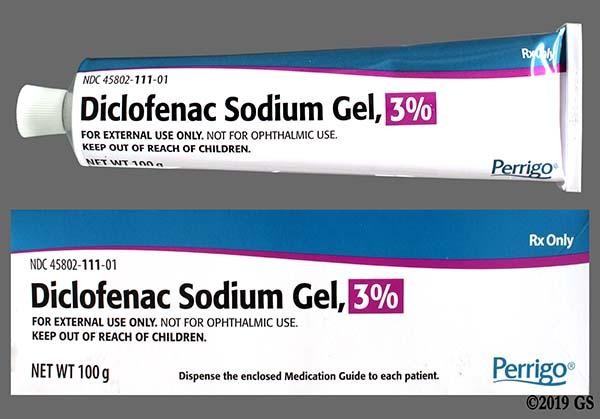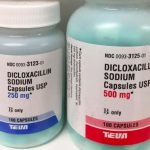
diclofenac 3% – topical, Solaraze
Medication Uses How To Use Side Effects Precautions Drug Interactions Overdose Notes Missed Dose Storage USES: This medication is used to treat a certain skin condition (actinic keratoses). Diclofenac is a nonsteroidal anti-inflammatory drug (NSAID). HOW TO USE: Use this medication on the skin only. Gently apply enough medication to cover the affected skin well, usually 2 times daily or as directed by your doctor. This medication is usually applied for 60 to 90 days. Wash your hands after using, unless you are using this medication to treat the hands. The dosage is based on your medical condition and response to treatment. Do not apply the medication in or around the eyes, open skin wounds, or infected/scraped/burned skin. If you do get the medication in those areas, flush with plenty of water. Use this medication regularly for maximum benefit. To help you remember, use it at the same times each day. Inform your doctor if your condition persists or worsens. It may take up to 30 days after finishing the medication for the skin to heal. SIDE EFFECTS: Rash, scaling, dry skin, swelling, or itching may occur at the application site. If any of these effects persist or worsen, inform your doctor or pharmacist promptly. Remember that your doctor has prescribed this medication because the benefit to you is greater than the risk of side effects. Many people using this medication do not have serious side effects. Inform your doctor immediately if you experience serious side effects, including: swelling of the ankles/feet/hands (edema), sudden/unexplained weight gain, unusual tiredness, change in urine output. Other medications similar to this medication may infrequently cause serious bleeding from the stomach or intestines. Also, related drugs rarely have caused blood clots to form, resulting in heart attacks and strokes. If you notice any of the following rare but very serious side effects, stop using this medication and seek immediate medical attention: black/bloody stools, vomit that looks like coffee grounds, chest pain, sudden vision changes, weakness on one side of the body, slurred speech. This drug may rarely cause serious liver problems. Get medical help right away if you have any symptoms of liver damage, including: dark urine, persistent nausea/vomiting/loss of appetite, stomach/abdominal pain, yellowing eyes/skin. A very serious allergic reaction to this drug is rare. However, seek immediate medical attention if you notice any symptoms of a serious allergic reaction, including: rash, itching/swelling (especially of the face/tongue/throat), severe dizziness, trouble breathing. This is not a complete list of possible side effects. If you notice other effects not listed above, contact your doctor or pharmacist. In the US -Call your doctor for medical advice about side effects. You may report side effects to FDA at 1-800-FDA-1088. In Canada – Call your doctor for medical advice about side effects. You may report side effects to Health Canada at 1-866-234-2345.
PRECAUTIONS: Before using diclofenac, inform your doctor or pharmacist if you are allergic to it; or to aspirin or other NSAIDs (e.g., ibuprofen, naproxen, celecoxib); or if you have any other allergies. This product may contain inactive ingredients (such as benzyl alcohol), which can cause allergic reactions or other problems. Talk to your pharmacist for more details. This medication should not be used if you have certain medical conditions. Before using this medicine, consult your doctor or pharmacist if you have: aspirin-sensitive asthma (a history of worsening breathing with runny/stuffy nose after taking aspirin or other NSAIDs), recent heart bypass surgery (CABG). Before using this medication, inform your doctor or pharmacist of your medical history, especially of: liver disease, stomach/intestine problems (e.g., bleeding, ulcers), heart disease (e.g., history of heart attack), high blood pressure, stroke, swelling (edema, water retention), poorly controlled diabetes, blood disorders (e.g., anemia, bleeding/clotting problems), asthma, growths in the nose (nasal polyps). Kidney problems can sometimes occur with the use of NSAID medications, including diclofenac. Problems are more likely to occur if you are dehydrated, have heart failure or kidney disease, are an older adult, or if you take certain medications (see also Drug Interactions section). Drink plenty of fluids as directed by your doctor to prevent dehydration and immediately inform your doctor if you experience any unusual change in the amount of urine. Before having surgery, inform your doctor or dentist that you are using this medication. This medicine may cause stomach bleeding. Daily use of alcohol and tobacco may increase your risk for stomach bleeding, especially when combined with this medicine. Limit alcohol and stop smoking. Consult your doctor or pharmacist for more information. Your condition may worsen when exposed to the sun. Avoid prolonged sun exposure, tanning booths, and sunlamps. Wear protective clothing when outdoors. Ask your doctor whether you should use sunscreen along with this medication. Older adults may be more sensitive to the side effects of this drug, especially stomach/intestinal bleeding, kidney problems, and worsening heart problems. Before using this medication, women of childbearing age should talk with their doctor(s) about the benefits and risks (such as miscarriage). Inform your doctor if you are pregnant or if you plan to become pregnant. During pregnancy, this medication should be used only when clearly necessary. It is not recommended for use during the first and last trimesters of pregnancy due to possible harm to the unborn baby and interference with normal labor/delivery. This medication may pass into breast milk. Though there have been no reports of harm to nursing infants, consult your doctor before breastfeeding. DRUG INTERACTIONS: Your doctor or pharmacist may already be aware of any possible drug interactions and may be monitoring you for them. Do not start, stop, or change the dosage of any medicine before checking with your doctor or pharmacist first. Before using this medication, inform your doctor or pharmacist of all prescription and nonprescription/herbal products you may use, especially of: aliskiren, ACE Inhibitors (such as captopril, lisinopril), angiotensin II receptor blockers (such as valsartan, losartan), cidofovir, corticosteroids (e.g., prednisone), cyclosporine, desmopressin, digoxin, lithium, methotrexate, pemetrexed, probenecid, other products applied to skin on the treated area, tenofovir. This medication may increase the risk of bleeding when used with other drugs that also may cause bleeding. Examples include anti-platelet drugs such as clopidogrel, "blood thinners" such as dabigatran/enoxaparin/warfarin, among others. Check all prescription and nonprescription medicine labels carefully since many medications contain pain relievers/fever reducers (aspirin, NSAIDs such as ibuprofen or naproxen). These drugs are similar to diclofenac and may increase your risk of side effects if taken together. However, if your doctor has directed you to take low-dose aspirin to prevent heart attack or stroke (usually at dosages of 81-325 milligrams a day), you should continue taking the aspirin unless your doctor instructs you otherwise. Ask your doctor or pharmacist for more details. This document does not contain all possible interactions. Therefore, before using this product, inform your doctor or pharmacist of all the products you use. Keep a list of all your medications with you, and share the list with your doctor and pharmacist.
QUESTION
OVERDOSE: This medicine may be harmful if swallowed. If swallowing or overdose is suspected, contact a poison control center or emergency room immediately. US residents can call their local poison control center at 1-800-222-1222. Canada residents can call a provincial poison control center. Symptoms of overdose/swallowing may include: seizures, severe stomach pain, change in the amount of urine, slow/shallow breathing. NOTES: Do not share this medication with others. Laboratory and/or medical tests (such as complete blood count, liver and kidney function tests) should be performed periodically to check for side effects. Consult your doctor for more details. Keep all doctor appointments and lab visits so your therapy can be monitored closely. MISSED DOSE: If you miss a dose, use it as soon as you remember. If it is near the time of the next dose, skip the missed dose and resume your usual dosing schedule. Do not double the dose. STORAGE: Store at room temperature between 59-86 degrees F (15-30 degrees C) away from heat. Do not freeze. Keep all medicines away from children and pets. Do not flush medications down the toilet or pour them into a drain unless instructed to do so. Properly discard this product when it is expired or no longer needed. Consult your pharmacist or local waste disposal company for more details on how to safely discard your product. Information last revised October 2013. Copyright(c) 2013 First Databank, Inc.
Report Problems to the Food and Drug Administration
You are encouraged to report negative side effects of prescription drugs to the FDA. Visit the FDA MedWatch website or call 1-800-FDA-1088.
Selected from data included with permission and copyrighted by First Databank, Inc. This copyrighted material has been downloaded from a licensed data provider and is not for distribution, except as may be authorized by the applicable terms of use.
CONDITIONS OF USE: The information in this database is intended to supplement the expertise and judgment of healthcare professionals. The information is not intended to cover all possible uses, directions, precautions, drug interactions or adverse effects, nor should it be construed to indicate that use of a particular drug is safe, appropriate or effective for you or anyone else. A healthcare professional should be consulted before taking any drug, changing any diet, or commencing or discontinuing any course of treatment.
CONDITIONS OF USE: The information in this database is intended to supplement the expertise and judgment of healthcare professionals. The information is not intended to cover all possible uses, directions, precautions, drug interactions or adverse effects, nor should it be construed to indicate that use of a particular drug is safe, appropriate or effective for you or anyone else. A healthcare professional should be consulted before taking any drug, changing any diet, or commencing or discontinuing any course of treatment.


